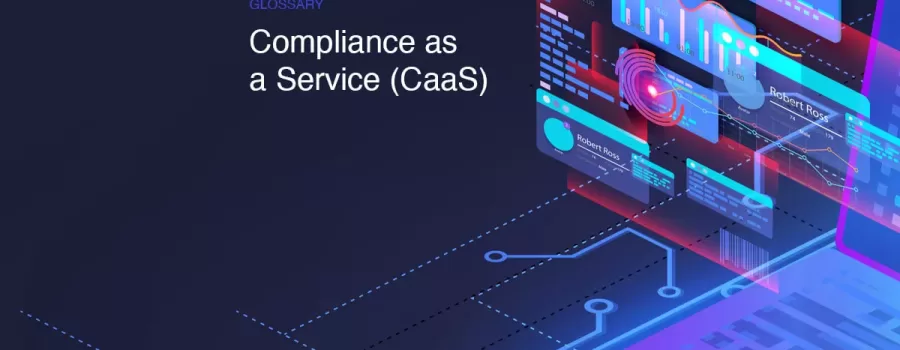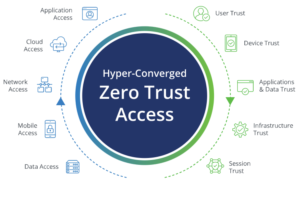Table of Contents
What is CaaS?
Compliance as a Service (CaaS) represents a modern approach to navigating the complex landscape of regulatory requirements and industry standards. In an era where businesses face ever-evolving compliance mandates, it offers a transformative solution. This innovative service model provides organizations with the means to outsource their compliance management needs to specialized providers, streamlining processes and ensuring adherence to industry-specific standards, ultimately safeguarding their operations, reputation, and stakeholder trust.
According to TechTarget, “The goal of Compliance as a Service is to reduce an organization’s compliance burden by outsourcing compliance management tasks to a third-party that has the resources required to meet regulatory requirements in a more cost-effective manner”.
How does Compliance as a Service work?
At its core, CaaS provides organizations with a holistic compliance management solution, including an initial assessment to identify compliance needs, customization of services to align with specific regulations, continuous monitoring using cloud-based tools, and automation to streamline tasks and reduce human error. Secure data management and expert support ensure confident navigation of compliance intricacies without compromising data security. As businesses evolve, it scales with them, offering a cost-effective and efficient means of staying ahead of regulatory changes, preparing for audits, and safeguarding their reputation in a world where compliance is paramount.

Picture credit: Ascend Technologies
What are the core components of CaaS?
The core components of CaaS typically include:
- Assessment and Customization: Assess an organization’s compliance needs and customize services to align with specific regulations.
- Continuous Monitoring and Alerts: Offer real-time tracking of regulations and automated alerts for potential issues or deviations.
- Automation: This key feature streamlines routine compliance tasks, such as data collection and reporting, reducing manual effort and human error.
- Reporting and Documentation: Generate and manage compliance reports and documentation required for audits and regulatory reporting.
- Data Security: Prioritize data security and compliance with data protection regulations.
- Expert Support: Access to compliance experts ensures guidance, assistance with challenges, and staying updated with regulatory changes.
- Scalability: Adjust to an organization’s changing compliance needs as it grows or as new regulations arise.
- Cost-Effectiveness: Outsourcing compliance management to CaaS providers reduces costs associated with internal staffing and infrastructure.
- Audit Preparation: Help organizations prepare for compliance audits, ensuring documentation readiness.
- Training and Education: Compliance providers offer training resources to understand compliance requirements.
- Policy Management: Tools may be provided for creating, managing, and enforcing compliance policies within the organization.
These core components collectively form a comprehensive compliance management strategy, allowing organizations to proactively address challenges, adapt to regulatory changes, and maintain strong adherence to industry-specific standards.
What is the background, education and experience of a typical compliance consultant?
A security compliance consultant typically requires a bachelor’s degree in a related field, such as Computer Science or Information Security, alongside industry-recognized certifications like CISSP, CISM, or CISA. Practical experience often begins with entry-level positions or internships in IT, security, or compliance roles, followed by progressive career growth and project management experience. Continuing education and professional development are essential to stay current in the field. Soft skills, including effective communication and problem-solving abilities, are also vital for security compliance professionals who must navigate complex compliance requirements, work with various stakeholders, and translate technical concepts into understandable terms.
What types of organizations does CaaS most benefit?
CaaS is particularly advantageous for organizations that operate in industries characterized by complex and ever-changing regulatory landscapes. Below are two types of organizations that benefit most from CaaS compared to traditional in-house compliance teams:
Startups and Small Businesses: Startups and small businesses often have limited resources and expertise to establish and maintain an in-house compliance team. This is an ideal solution for these organizations as it provides cost-effective access to compliance expertise and tools. By outsourcing compliance management, startups and small businesses can navigate regulatory requirements without the burden of hiring, training, and retaining dedicated compliance staff. CaaS scales with their growth, allowing them to focus on core operations while ensuring they remain compliant with industry regulations.
Highly Regulated Industries: Industries such as finance, healthcare, and pharmaceuticals face stringent and frequently changing regulations. In these sectors, compliance is not just a requirement but a critical component of operational integrity and reputation management. Compliance solutions are especially beneficial here as it offers real-time monitoring and alerts, ensuring that organizations stay up-to-date with the latest regulatory changes. Traditional in-house compliance teams may struggle to keep pace with the complexity and volume of evolving regulations, making CaaS a more reliable and efficient choice for maintaining compliance and reducing the risk of costly penalties.
Another often overlooked segment are companies doing business outside of the U.S. and with European Union (EU) citizens and businesses. In a report titled, 30 Biggest GDPR Fines So Far (2020, 2021, 2022) by Tessian, it’s stated that “The General Data Protection Regulation (GDPR) offers some of the strictest penalties among data protection regulations and standards. Under the GDPR, EU authorities can fine organizations up to €20 million, or 4% of worldwide turnover for the preceding financial year, whichever is higher”. Those are extremely hefty fines, if compliance needs aren’t properly sorted out.
Who benefits the least from CaaS offerings?
Although this offers numerous advantages, there are certain types of organizations or situations where it may not be the most suitable option:
Large Enterprises with Extensive Resources / In House Expertise: Large, well-established enterprises often have the financial and operational resources to maintain comprehensive in-house compliance teams. These organizations may prefer the direct control and oversight that comes with managing compliance internally. Additionally, they might already have invested significantly in compliance infrastructure and may view CaaS as duplicative or less cost-effective.
Highly Customized or Niche Businesses: Some businesses operate in highly specialized or niche markets where compliance requirements are exceptionally unique and require tailored solutions. In such cases, a one-size-fits-all offerings may not fully align with the specific needs of the organization. These businesses may prefer the flexibility and customization that comes with an in-house team that can design compliance strategies and solutions tailored to their unique circumstances.
Businesses with Minimal Compliance Needs: Some businesses operate in industries with minimal regulatory oversight and straightforward compliance requirements. For these organizations, the overhead associated with compliance services may outweigh the benefits, and they may find it more cost-effective to manage compliance requirements internally with a smaller, dedicated team.
What are some of the most common frameworks and standards CaaS can help satisfy?
Compliance firms offer comprehensive support for organizations seeking to meet various security frameworks and standards. They assist in aligning businesses with internationally recognized frameworks like ISO 27001 for robust information security management and the NIST Cybersecurity Framework for effective risk management. Healthcare organizations benefit from the providers’ expertise in achieving HIPAA compliance, ensuring the protection of patient health information. Additionally, these firms enable companies handling credit card transactions to adhere to PCI DSS standards, safeguarding sensitive cardholder data. For organizations with a global reach, compliance firms aid in complying with GDPR requirements, which focus on data privacy and consent management.
Furthermore, security compliance providers extend their services to encompass industry-specific regulations. For financial institutions, they guide adherence to FFIEC guidelines, enhancing the security and integrity of financial data. Government agencies and contractors benefit from CaaS support in achieving FISMA compliance, ensuring the security of federal systems. CaaS firms also assist with frameworks such as SOC 2, CIS Controls, COBIT, and the CIS Controls, enabling organizations to bolster their cybersecurity defenses, align IT processes with business goals, and meet industry-specific mandates. These firms play a pivotal role in simplifying and streamlining compliance efforts across various sectors and regulatory environments.

Picture credit: Satori Cyber
What are the disadvantages of partnering with a CaaS provider?
Compliance firms offer numerous advantages, but it also comes with certain disadvantages to consider. One key drawback is the cost, as services can be expensive, especially for organizations with complex compliance needs. Additionally, organizations may experience a loss of control and dependency on the provider when outsourcing compliance functions. Concerns over data privacy and security must also be addressed when sharing sensitive compliance-related information.
Customization challenges may arise for organizations with exceptionally unique compliance needs, and integrating CaaS solutions with existing systems can be complex. Limited industry expertise from some CaaS providers can pose challenges when dealing with highly specialized regulatory requirements. Overreliance on CaaS may result in a decline in in-house compliance knowledge, and effective communication and collaboration between the organization and the provider are crucial for success. Finally, implementing CaaS may require changes in organizational processes and roles, necessitating effective change management strategies.
Organizations should carefully assess these disadvantages against the benefits of outsourcing their compliance, taking into account their unique needs, resources, and risk tolerance, to determine if compliance services align with their compliance management goals.
Closing
In conclusion, CaaS represents a powerful tool for organizations seeking to navigate the intricate landscape of regulatory compliance efficiently. While it offers numerous benefits, including cost-effectiveness, expert support, and scalability, it’s essential to acknowledge the potential disadvantages, such as the cost of outsourcing, data security concerns, and potential loss of control. Organizations must carefully evaluate their specific needs, industry requirements, and risk tolerance to make an informed decision about whether CaaS aligns with their compliance management objectives.
Ultimately, the choice between CaaS and traditional compliance management approaches depends on the organization’s unique circumstances and priorities. By weighing the advantages and disadvantages, businesses can make an informed decision that optimizes their compliance efforts, safeguards their operations, and ensures their continued adherence to industry-specific regulations and standards.
Here at EkoCyber, our compliance experts are ready to answer any questions you may have. Check out our GRC services to see how we can best partner with your business on their compliance objectives!





